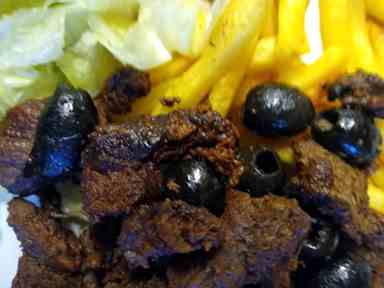Beef with Olives
This recipe is here for reasons, see the discussion and feedback,

This is an afternoon recipe, needs at least two hours. This is what I did, but please look at variations.
Ingredients
A lot of chunks of beef
Garlic, two or three cloves (no more, even with the feeble garlics from supermarkets)
Black olives, pitted, a standard jar
White wine, 2/3 of half bottle
Red wine stock cube
thyme, two or three teaspoons
A bay leaf
Grindable pepper and salt
Dessertspoon or two of butter
Two dessertspoons of olive oil
Tools
Greaseproof paper, preferably, or kitchen foil
A bigger boil‐pan, with lid (but see Variations)
Make
If frozen, microwave the beef for speed. If not, defrost in pan, but that’s a lot slower
If the olives are in juice, drain them, put them in a bowl near the oven to dry
Get the oil and butter frying and bubbly. Throw in the beef and get it brown. Maybe not cooked, but browned
Sling in the wine and crushed garlics, let it all get heated and bubbly for a minute
Stir in the thyme, and stock cube
Season with a grind of pepper and salt. Not a lot, one grind
Place two sheets of greaseproof paper over the pan top, press in the lid
Turn right down to bottom heat. If you have one, switch to the small burner or ring
Leave for two hours. Every hour, go back and check it has not burned dry—if it has, throw in a shot‐glass of wine. Also check the lid has not popped—it can do this because the vapour presses it out. But you need this near‐sealed on a very low temperature
Two or three songs before the end, throw in the olives
This recipe is called a stew, but it should end near‐dry.
I served with a few microwave chips and lettuce salad. I’ve heard also about fried bread, potato croquets, and rice.
Variations
To make the classic recipe, you need rump beef, red wine, sprigs of thyme, and a slice of orange peel. I didn’t have any of those
I bet it gets better and better with better wine
The lid is necessary. A way to get round this is to use silver foil, then tie it over the top.
To make the classic recipe, after frying the beef, you pour a a few dessertspoons of warm spirit over the beef and set it alight. Brandy preferably, but I guess whiskey or Cointreau would be fine
Three or four hours cooking will do extra good
Discussion
This recipe is right on the nerve. You see I, though no expert, believe the English had access to olive oil before the potato. But this recipe comes over as exotic, because it was gathered by Elizabeth David. It was published under the name «Bœuf à la gardiane» (why it has that name is beyond me) and comes from from Provence in the south of France. So it fits into the “We can live better than this” movement from after World War Two.
I note there is a lot of sharp thinking in this process. The spirit burning will kill fat in the meat. The wine will break down tough meat. The sealed, dry stew will keep flavour in. Olives are not an obvious choice etc. It’s educational.
Feedback
Critical‐range disaster. For one person, shovelled into the bin. For two others, outside their ken, unimpressed and part‐finished. I must use feedback as my measure, so this meal was a not only a failure, but in the future to be avoided.
But feedback is not the only measure of food. I must take feedback as the measure, but it is not the only measure. Quick, this is one of the best meals I have cooked. It is in a different league. And two of us knew it.